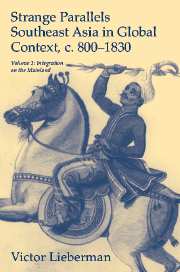Strange Parallels
Volume 2 of Victor Lieberman’s Strange Parallels, Southeast Asia in Global Context, Circa 800-1830 is out. Volume 1 is one of the most extraordinary books of historical scholarship I have ever read. It builds upon and expands vastly theoretical and conceptual approaches pioneered by Anthony Reid. It’s been too long since I have read volume 1 to review it here. Lieberman’s ‘strange parallels’ are resonances between ‘east’ and ‘west’, the evolution of the state, trade, political and cultural centralization during the period when these two regions of the world are supposed to be undergoing separate and unequal development. When I was doing a lot of reading, years ago, (renewed recently), I started to feel that the European reformation, and nascent capitalism, and changes in the European state paralleled similar changes in Southeast Asia, and that developments in world trade might be the stimulus common to both. The rise of a neo-Confucianist state in Viet Nam following the defeat of the Ming (15th century, see John K. Whitmore’s The Development of Le Government in 15th Century Vietnam, his Cornell dissertation, and Vietnam, Ho Quy Ly, and the Ming (1371-1421)), the rise of the Islamic trading states in Malaysia, and similar changes in Thailand and Burma suggest that there were global events before global conquest. Modernity is not just indigenous to the west but the result of an interaction which at times took the form of competition. William McNeill in his books pursued this idea some, especially his world history and The Pursuit of Power, the follow up to the eccentric and brilliant Plagues and Peoples.
Lieberman is much more in the world systems school of meta or global history than McNeill, who is no Marxist and doesn’t go in for theory so much as a mapping out global environmental constraints and stimuli to history. But Lieberman brings the empiricist’s eye to the proceedings, and his background is in Burmese history. He is able to focus simultaneously on the details of local histories and the vast conceptual abstractions of world system theory.  I can’t wait to read volume 2 and would urge the first volume on anyone who wants to get both a granular and global perspective on Eurasia from 800-1830.




